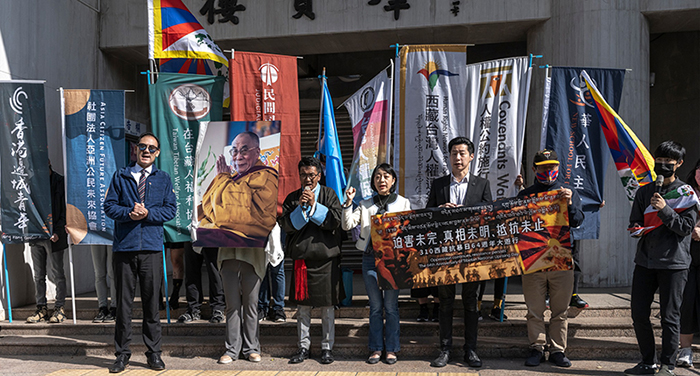Taipei — Tibetan activists and Tibet supporters in Taiwan organised the “2023 Cycling for a Free Tibet” on February 8, and they said, “China’s oppression of Tibet has not ceased over the years, but has continued to repress Tibetans in new ways. Tibetan children are forced to go to concentration camp-like boarding schools to receive a Chinese education; DNA is taken from Tibetans to increase surveillance of Tibetans.”
Cycling for a Free Tibet is an annual activity that was initiated in 2011 by the then President of the Human Rights Network for Tibet and Taiwan, Tashi Tsering. Since then, the activity has taken on much broader connotations and draws larger crowds each year. The act of cycling, in a circular loop, also stands for the fact that the struggle for a Free Tibet will continue as long as it is needed.
This year's "Cycling for a Free Tibet," entitled "Oppression Continues, Resistance Persists," began on February 8, 2023, with awareness campaign programs at various locations in Taiwan regarding Tibet and the current situation in Tibet and China, and will end on March 10, 2023, the 64th anniversary of the Tibetan National Uprising.
Tashi Tsering, the President of the Executive Director of the Human Rights Network for Tibet and Taiwan, said, “This year marks the 64th anniversary of Tibetan national Uprising Day. I still remember when the first march was held in 2004, there were only seven Tibetans walking in the streets of Taipei with Tibetan flags, pictures of His Holiness the Dalai Lama, and English slogans. But after 20 years, the annual March, 10th march has become a very important event for Taiwanese people or at least for the social movement in Taiwan, and the number of participants is increasing.”
"The Chinese Communist Party's oppression of Tibet has not ceased over the years, but has continued to bully Tibetans in new ways. Under Xi Jinping's slogan of "the sense of community for the Chinese nation," Tibetan children are forced to attend concentration camp-like boarding schools to receive a Chinese colonial education; Tibetans' DNA is collected to increase surveillance of them; religious persecution has intensified, and Tibetan culture and traditions are disappearing,” Tashi added.
"Seventy years have passed since the signing of the 17 Agreements in 1951, and Tibetans are still struggling. We have seen not only Tibetans, but also East Turkestan, Southern Mongolia, Hong Kong, and even the Chinese themselves, struggle against the oppression of the Chinese Communist regime,” Tashi said, while talking about growing number of people protesting against the Chinese government.
A statement of the Cycling for a Free Tibet said, “Tibet has been an independent country since ancient times, with a rich and unique religious, cultural and political tradition. Tibet was invaded by the Chinese Liberation Army and forced to sign the Agreement between the Central People's Government and the Local Government of Tibet commonly known as the 17th Point Agreement, in 1951, Tibetans have been deprived of their freedom. On March 10, 1959, a nationwide protest of 10,000 people in Lhasa, the Capital of Tibet, resulted in a bloody crackdown by the Chinese army and police. His Holiness the 14th Dalai Lama, the highest religious and political leader of Tibet, had to flee to India with thousands of Tibetans.”
The statement said that the brave Tibetans continue to protest against the oppressor, “Since the 1959 uprising, there have been large-scale protests in Lhasa and throughout Tibet in 1987, 1988, and 1989. In March 2008, before China hosted the Beijing Olympics, there were numerous protests across the plateau, which were met with massive repression. Since 2009, as the Chinese government's crackdown on Tibetans continues to rise, more than 150 Tibetans have set themselves on fire to defend their faith, dignity, and beliefs, both inside and outside Tibet.”
"Under Chinese colonial rule and a strong policy of assimilation and Sinicization, the religious, cultural, linguistic and other traditions of Tibet, and even its fragile natural ecosystem, have been severely damaged by oppressive policies," the statement added.
"Today, 64 years later, the Chinese Communist Party's oppression of Tibet has not only not stopped, but has intensified. However, Tibetans are still resisting, and for 64 years, the search for the truth will not stop, and the resistance to totalitarianism will continue. The Tibetan people are still resisting," the statement concluded.


![Tibet has a rich history as a sovereign nation until the 1950s when it was invaded by China. [Photo: File]](/images/stories/Pics-2024/March/Tibet-Nation-1940s.jpg#joomlaImage://local-images/stories/Pics-2024/March/Tibet-Nation-1940s.jpg?width=1489&height=878)
















